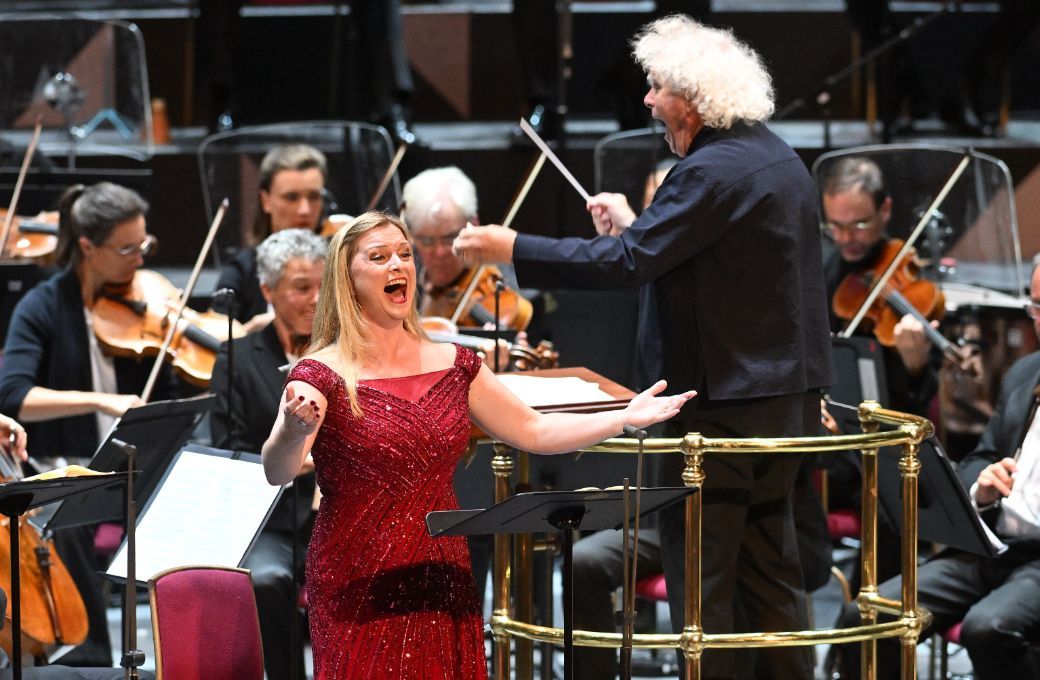After Schumann completed Das Paradies und die Peri in 1843, he declared it the best thing he had done. Composers have to say things like this in order to get out of bed in the morning. What is unusual, though, is that he continued to think this way, even as his songs and piano music won him more glory. For Schumann, writing for choir and orchestra was the summit of achievement as a composer. He was not cut out to emulate the B minor Mass or Missa solemnis, and he hedged his bets with the Peri, identifying it as a Dichtung (Poem) rather than oratorio.
Performers and listeners have begun to take the piece seriously during the last couple of decades. Not for the first time, a recording by Sir John Eliot Gardiner set the scene for a revival, at least outside German-speaking lands. Since then, Sir Simon Rattle has surely led more performances than anyone else, and so it was fitting that he should give its belated premiere at the BBC Proms towards the end of his departing season as Music Director of the LSO, a season programmed like a Rattle hit-parade and concluding on Sunday with Mahler’s Ninth Symphony.
Rattle’s shape for the piece used more closely to follow Gardiner’s. In common with other interpretations which he has refined over the years, from Beethoven 9 to Turangalîla, he seeks less contrast than before and more continuity, fewer attacks and longer lines. The consequence for this Peri was a Monteverdi-like coloration of the orchestra as a support for the singers and punctuation of the text. The first two of the Peri’s three parts move seamlessly between genres, and between storytelling and set pieces – recitative, arioso, arietta, song, Handelian chorus, fairy chorus, lullaby – and the threads need pulling together. Given his palpable affection for the piece, it was understandable that Rattle might tease out this suspension or that cadence; the pulse was gentle but steady.

Fresh from her triumph in the C minor Mass nine days earlier, Lucy Crowe returned as the Peri, the mythical half-fairy who tries, fails, tries, fails and eventually succeeds to win entry to Paradise by means of good deeds. The advantage of an ostensibly far-fetched scheme is the opportunity to write three kinds of death scene to close each part – the first angry and defiant, the second loving and peaceful, the third transcendental.
Always luminously coloured, sometimes stilled in wonder, elsewhere urgently projected, Crowe soared above the orchestra, while Andrew Staples’ narration cut through it with countless telling accents and turns of phrase. On the other side of the platform, Magdalena Kožená radiated warmth across her range as the Angel, and duetted superbly with Jeanine de Bique, who seized her single solo with winning freshness at a point when the momentum threatened to sink under clouds of musical candy-floss. Tenor Linard Vrielink brought steel as well as ardour to his first-part sketch of the dying warrior. Only baritone Florian Boesch sounded out of sorts in a none too sympathetically written part, bunched up in the more episodic third part and melodically thin. Every word of the LSO Chorus’s German was crystal clear; Rattle could have let them and the orchestra off the leash now and then.
It must have made commercial and environmental sense to forego printing the sung text in the programme booklet, and instead to project Thomas Moore’s original Lalla Rookh poem as surtitles. The decision proved a false economy, all the more so given the vast majority of listeners were making their first acquaintance with the piece. Moore’s dreadful poetry requires its own translation as much as the German version made for Schumann by his friend Emil Flechsig, who prudently toned down doggerel such as “My feast is now of the Tooba Tree,/Whose scent is the breath of Eternity!” In any case, the syntax and vocabulary of 19th-century bardic poetry were not made for parsing line by line and at speed. The programme offered little help, not so much as a list of numbers, only an apologetic essay suggesting that Schumann’s themes of guilt and redemption are as old hat as Moore’s poesie. His music for the Peri stands on its own merits, and Part 2 in particular is one long purple patch of sustained inspiration which he never equalled elsewhere. The performance deserved to win converts from a decent but not full house, and a little more assistance would not have gone amiss.


